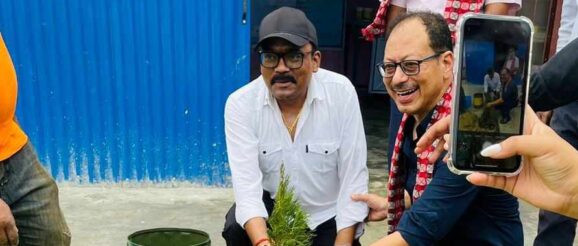From Tradition To Green Innovation: Painting A Sustainable Future | New Spotlight Magazine

The growth of environmentally conscious businesses and change-makers is gradual but constant, with many of them making persistent efforts to bridge the gap between environmental sustainability and economic prosperity. One such innovation has sprung from the centuries-old Nepali practice of covering walls and floors with cow dung. Inspired by this old tradition, green entrepreneurs have turned it into an innovative, eco-friendly, and cost-effective paint made from cow dung.
This eco-paint is non-toxic, odorless, and devoid of heavy metals, in contrast to traditional paints that emit hazardous chemicals and volatile organic compounds into the atmosphere. The primary cause of the paint’s antifungal and antibacterial characteristics is the scientifically processed cow dung, which functions as a natural barrier against the growth of hazardous germs on painted surfaces. Additionally, it has been noted that the covering this paint creates helps control temperature, making interiors warmer during the winter months and cooler during the hotter summers.
The innovative concept is inspired by the Government of India’s initiative to promote cow dung paint, which is strongly entrenched in Nepali history of using cow dung as a natural coating material. Helvetas’ InElam project aims to encourage local-resource-based firms, first enabled Birgunj Metropolitan City entrepreneurs to examine and test this notion in India. After extensive research and development, it was the combined efforts of two private sector actors, Birgunj Nepal Business Consultancy and Husk Power Nepal Private Limited, that effectively localized this technology from India.
They effectively lowered expenses by one-third by building treatment and production machinery in Nepal, reducing the cost from seventeen million Nepali rupees to a mere five lakh Nepali rupees.This localization of technology greatly contributes to the affordability of eco-paint, which boosts its replication potential and has the potential to transform the paint business through micro entrepreneurs. This project collects cow manure from farmers, which not only helps to keep their surroundings clean but also offers them with a new source of revenue. Farmers can now sell their cow manure to firms of this type for up to 8 Nepali rupees per kilogram in the foreseeable future, transforming cow dung into a more lucrative commodity.
Husk Power Nepal, in conjunction with Helvetas Nepal, inaugurated the manufacturing unit for eco-friendly paint on June 25th, 2023. The occasion was presided over by the Chief Administrative Officer (CAO) of Birgunj Metropolitan Office, who thanked the stakeholders for their achievements in producing this successful and easily transferable technology. He emphasized the initiative’s good impact at the grassroots level by not just supporting local green entrepreneurs but also contributing to farmer income. The CAO also promised on behalf of the local government to prioritize the acquisition of eco-paint, specifically for the construction and refurbishment of temples and cultural heritage sites, which contributes to the preservation of both the environment and cultural identity.
The eco-friendly paint’s extensive laboratory test reports have been completed, proving the absence of heavy metals and harmful compounds. After completing this critical step, the next stage entails acquiring government certification. Once authorized, Husk Power Nepal would be able to advertise their product and generate information materials to help other prospective companies. The emulsion eco-paint has also been discounted to 150 Nepali Rupees per liter, which is less than half the price offered by commercial paint businesses. By providing a cost-effective alternative, more individuals and businesses may embrace sustainable options, accelerating the adoption of eco-friendly activities.
Engineer Manoj Kumar Gupta, Managing Director of Husk Power Nepal, remains a staunch supporter of knowledge sharing, even as young entrepreneurs replicate their eco-paint idea. Husk Power Nepal, in addition to their eco-paint program, exhibits a great commitment to environmental protection through a variety of other green initiatives, one such undertaking being their active involvement in the production of smoke-free stoves. He claims that “sharing knowledge not only expands one’s own understanding but also contributes to the improvement of the product itself.” Sunil Kumar Sah, Managing Director of Birgunj Nepal Business Consultancy Private Limited, who was instrumental in localizing this technology, expressed similar sentiments.
Dr. Prabin Manandhar, Country Director of Helvetas Nepal said, “Helvetas Nepal is dedicated to empowering private sector actors and fostering a supportive environment for the growth of green jobs and a thriving green economy.” In the future, the InElam project and Helvetas Nepal will play a critical role in assisting the sector by developing a learning center for young students and aspiring green entrepreneurs. Similarly, it is critical to strengthen the capacity of such private sector actors to advocate for laws and regulations that promote the growth of environmentally friendly enterprises. The purpose of this joint endeavor is to develop a culture of continuous learning, innovation, and advancement, ensuring the eco-paint industry’s long-term prosperity.
Rana is associated with Helvetas Nepal
